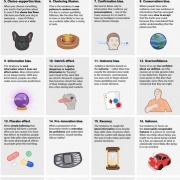Varying Tasks to Increase Compliance
 A new study illustrates how providing variety in job-related tasks for workers contributes to rule adherence and stymies unethical decision making.
A new study illustrates how providing variety in job-related tasks for workers contributes to rule adherence and stymies unethical decision making.
The paper “Reducing Organizational Rule Breaking Through Task Variety: How Task Design Supports Deliberative Thinking,” is authored by Rellie Derfler-Rozin, ES collaborator Celia Moore and Bradley R. Staats and published in Organization Science. The authors discuss the positive implications of this research for designing roles and responsibilities in various organizational settings, and the beneficial outcomes for both workers and businesses.
“By showing that small changes to how tasks are sequenced (one aspect of job design) trigger positive benefits that have not been explored to date (enhanced deliberative thinking), ultimately decreasing organizational rule breaking … our work offers a new tool in the organizational battle against rule breaking,” the researchers wrote.
The paper begins by explaining the difference in Type 1 (automatic, intuitive) vs. Type 2 (deliberate/reflective) thinking, and then demonstrates how and why organizing tasks in a highly varied way activates our Type 2 processes. Reliance on Type 2 processes reduces the likelihood that employees will be working in “auto-pilot” mode, as compared to Type 1 mindsets. Employers can activate Type 2 thinking by differentiating tasks, creating more engagement in work. This results in disengaged more mindful approach to work, which in turn reduces a person’s desire to find ways to work around the rules.
Case in point: the study focused on home loan officers in Japan and a tendency to take advantage of company break time. By differentiating the tasks that were assigned to workers, the authors found “that greater pre-lunch task variety is related to a decreased likelihood to violate company regulations regarding lunch breaks. A one-standard-deviation increase in pre-lunch task variety decreases the odds of taking a long lunch by 32%. …The field data illustrated that greater task variety is related to a lower likelihood of violating company break time regulations. The results of this study are important as they show the effect of “naturally occurring” task variety on rule breaking in an actual workplace setting with real employees.”
Other research referenced by the authors highlight the study of circumstances in which a person’s desire for instant gratification may induce rule breaking, such as (i) studies of the work environment for nurses and their non-compliance with hand washing regulations to save time (Dai et al. 2015, Grant and Hofmann 2011); (ii) instances where workers can have a more relaxing day if they take longer breaks than what the policy permits (Roy 1959), and (iii) how students can earn higher grades when they cheat by working together on take-home exams (Pérez-Peña 2013). The authors of this and the aforementioned studies make the case that our instinctive response is often to break rules, particularly when compliance contradicts our immediate (hedonic) self-interest. Knowing this, task differentiation becomes a tool to combat our natural inclination to circumvent rules by disrupting our tendency for Type 1 mindsets.
Leaders would do well to think about how to apply the lessons from this study to their business culture. Research shows that when employees are more thoughtfully engaged, they are less likely to commit ethical lapses. Now, leaders have another tool in their arsenal to combat detrimental outcomes and it is as easy as 1,2,3 or 3,1,2 or 2,1,3.
Further Reading
- Decision Making [research page]
- Ethical Decision Making: Easy in training, harder in reality [blog]









